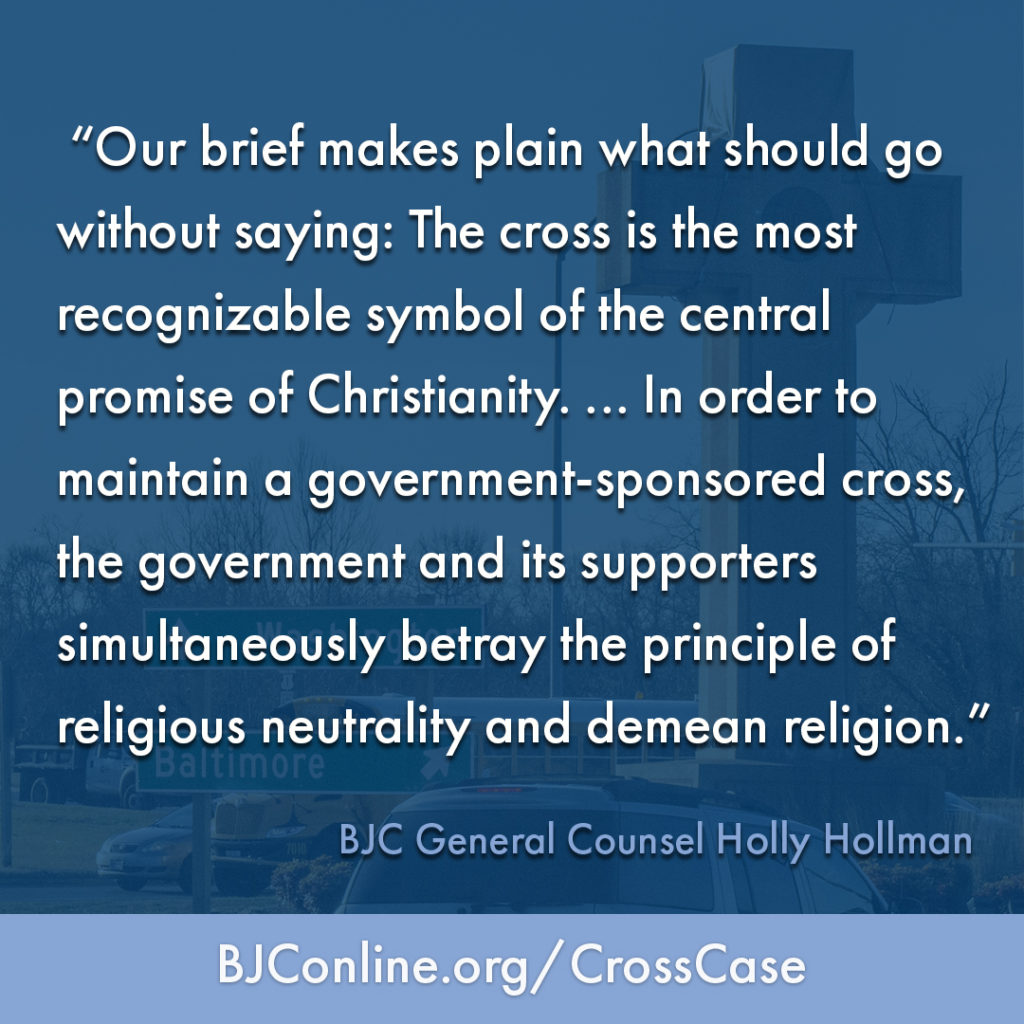Hollman: Government should remain neutral on matters of religious truth
For Immediate Release: January 31, 2019
Media contact: Cherilyn Crowe / [email protected] / Office: 202-544-4226 / Cell: 202-670-5877
WASHINGTON – A 40-foot cross on government land at a major intersection is unconstitutional, according to a brief filed by the Baptist Joint Committee for Religious Liberty (BJC) and other Christian and Jewish organizations. The cross, located in Bladensburg, Maryland, violates the government’s fundamental obligation to be neutral between competing religious claims.
The friend-of-the-court brief was written by church-state scholar Douglas Laycock, who holds endowed chairs at the University of Virginia and the University of Texas, and filed at the U.S. Supreme Court in the case of The American Legion v. American Humanist Association.
The following statement is from Holly Hollman, general counsel of the Baptist Joint Committee for Religious Liberty:
“Our brief makes plain what should go without saying: The cross is the most recognizable symbol of the central promise of Christianity. While Christians commonly display the cross to promote Christian teachings as revealed in scripture, the government should not. The cross is a symbol that is specific to Christianity, and the government’s efforts to claim otherwise are hollow and offensive.
In order to maintain a government-sponsored cross, the government and its supporters simultaneously betray the principle of religious neutrality and demean religion. People of all faith traditions are harmed when the government violates its fundamental obligation to remain neutral between religions.”
The American Jewish Committee, Central Conference of American Rabbis, Evangelical Lutheran Church in America, General Synod of the United Church of Christ, and the Stated Clerk of the General Assembly of the Presbyterian Church (U.S.A.) joined the brief.
Oral arguments at the U.S. Supreme Court will be February 27.
To read the amicus brief, see photos of the cross, and listen to a podcast with Hollman and BJC Executive Director Amanda Tyler, visit BJConline.org/CrossCase.
——–
Excerpts from the brief:
“Using the cross to honor our nation’s war dead reflects either the erroneous assumption that our military is comprised entirely of Christians, or the equally erroneous assumption that the most sacred symbol of Christianity somehow honors non-Christians as well.”
“Petitioners’ welter of alleged secular meanings for the cross, and their efforts to minimize its religious meaning, are offensive to many Christians. The Commission violates its obligation to be neutral among faiths both when it sponsors the cross and when it spins stories attempting to secularize the cross.”
“The cross is not a secular symbol, and neither the Commission nor the Court can make it so.”
“The cross is the central symbol of Christianity, invoking the central theological claim of Christianity: that the son of God died on the cross, that he rose from the dead, and that his death and resurrection offer the possibility of eternal life.”
“The Latin cross was not arbitrarily chosen to honor the dead; it is not just an elongated plus sign. If that were all, a division sign would work as well. The cross honors the Christian dead because it promises resurrection.”
“To hold that government today can do anything that early generations of Americans did would turn the First Amendment into a Protestant capture. The principle of keeping government out of religious controversies remains the same, but what is religiously controversial has changed as religious diversity has increased.”
“If this Court says that a Latin cross is predominantly secular, then words and symbols have no meaning and the Court has consigned the Establishment Clause to the world of Alice in Wonderland.”
“To hold that government cannot sponsor a freestanding cross does not imply the removal of every cross from every government venue. Most obviously, privately chosen religious symbols on individual tombstones are plainly constitutional.”
###
Based in Washington, D.C., the Baptist Joint Committee for Religious Liberty is an 83-year-old religiously based organization working to defend religious freedom for all people and protect the institutional separation of church and state in the historic Baptist tradition.





